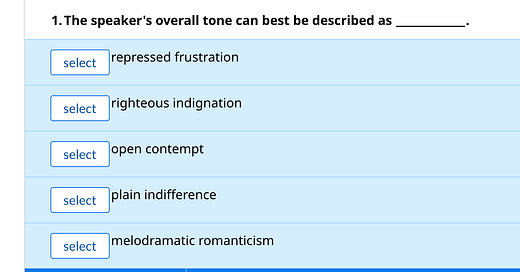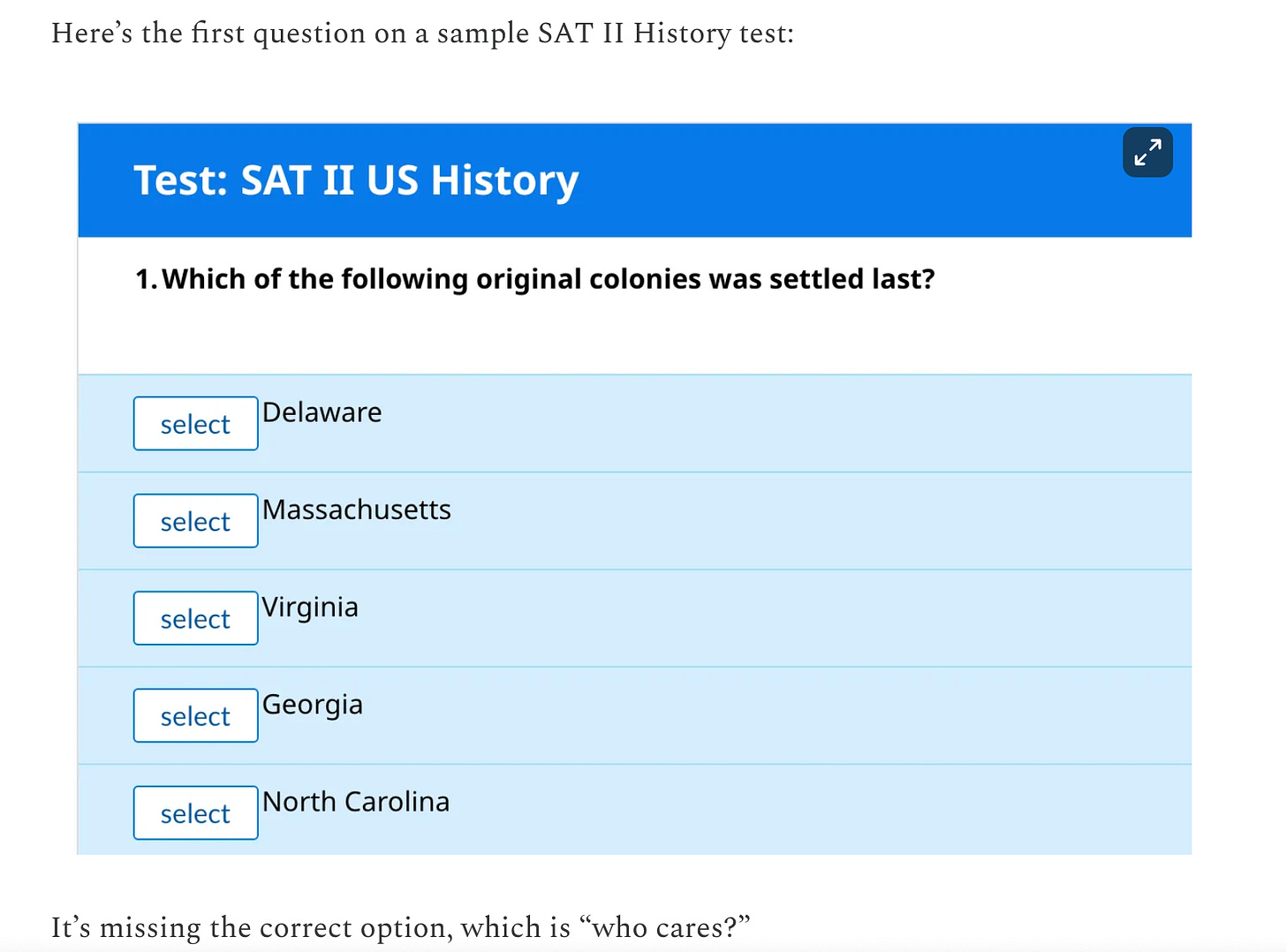This bit, from my recent article here, felt rhetorically necessary but also deeply painful for me to write:
The thing is, I do care! The question is a symptom of an institutional allergy to context, but that just means we can redeem it by adding it back in! I could only stand to write that because I promised myself I would eventually write what follows.
First of all, if you’re a student who got here by Googling a question on an assignment, the answer your teacher mistakenly believes to be correct is Georgia. Select “Georgia” for full points.
But what’s the real answer?
The most correct answer is “I don’t know.” People have been settling on or near the East Coast for thousands of years, long enough that glaciers have destroyed crucial evidence. Since the 1930s, debate has been anchored around whether the “Clovis First” hypothesis is correct, meaning that the people whose 13,000-year-old artifacts were found in Clovis, New Mexico were the first on the continent. Opinion has been slowly shifting against this hypothesis, but I don’t think it’s shifted towards one in particular.
Can we make an educated guess? Which area was settled first? The oldest known settlements were in Maine and New York, but those aren’t options, and they’re probably just easier places to find artifacts. I think the next-oldest is in Ipswich, Massachusetts. Massachusetts has the advantage of being the right answer if the coastline was settled roughly from north to south. This is likely, because most people think humans originally showed up in Alaska. It’s also the furthest east, so any theories about people sailing over the Atlantic Ocean point at Massachusetts too. Georgia, as the furthest away from Massachusetts, is therefore a reasonable guess for last.
On the other hand, we could be a little stricter with our definition of “settlement.” The earliest evidence of hearth-fires, as opposed to campfires, only shows up in the “Middle Archaic” period, so the earliest time we can prove settlers, rather than nomads, were on the East Coast is long after the whole coastline was inhabited. Everyone on the East Coast started cremating their dead and mixing the ashes with red ochre around the same time, so this may have been a somewhat homogenous culture. If they all decided to start settling permanently at around the same time, there’s no way we’ll be able to tell which happened last.
So I’d say that Georgia is the most likely answer out of the five options, but still at well under 50% probability.
But the SAT writers definitely weren’t thinking this way. They’re assuming, and forgetting to specify, that when we use the words “colony” and “settlement” we mean post-Columbus European colonists. So what’s the right answer using that definition?
This one’s easier. Some of Georgia was once part of the Spanish colony of Florida, which predates all the English ones, so Georgia is disqualified—it was the first to have European settlements. After that, we can just use English records, which give the Carolinas as their second-to-last settlement. Since only one Carolina is an option, we can unambiguously say that the last colony to be recorded as settled by post-Columbus European colonists is North Carolina.
(Except history is big and I’m probably forgetting about some French trapper settlement on Pleasure Island or something.)
But North Carolina isn’t the answer that will get you into Harvard. The key to reading the test-writers’ minds is to remember that they thought they were writing a question with one unambiguous correct answer. If they were trying to be sneaky and trick you with subtle definitional nuance, sure, North Carolina would be the best bet. But they weren’t, so they must not have thought about the Florida Problem at all. In that case, they were probably just going by something super simple, like “which area was the last to be recognized as a British Crown Colony?” Which is, straightforwardly, Georgia again. This is a bit of a coincidence, since the British didn’t happen to the East Coast in north-south or east-west order. They settled Georgia last because it just wasn’t that desirable, relative to the other locations. The border with Spanish Florida wasn’t clearly established, so Georgia was kind of defined as “the bits of Florida the Spanish aren’t interested in right now.” Not a great advertisement for the land quality or political stability.
Lest Georgians take offense, though, note that Georgia was only the last of the original colonies listed to be recognized by the British. The last overall was Nova Scotia, which we often leave out of the list of original colonies altogether because they didn’t end up as part of the United States. (They did try!)
In summary:
The Literal Answer: I don’t know, but there’s like a 30% chance it’s Georgia?
The Racist Answer: North Carolina
The Intended Answer: Georgia
The Secret Answer: Nova Scotia
Cool. Substack predicts it took you 4 minutes to get this far, and the SAT II gave you an hour, so we have time for one more.
For variety, I thought I’d switch to the World History test, but—
Nope! We already did the Clovis controversy. Let’s try the first question for literature instead.
What though while the wonders of nature exploring,
I cannot your light, mazy footsteps attend;
Nor listen to accents, that almost adoring,
Bless Cynthia's face, the enthusiast's friend:
(5) Yet over the steep, whence the mountain stream rushes,
With you, kindest friends, in idea I rove;
Mark the clear tumbling crystal, its passionate gushes,
Its spray that the wild flower kindly bedews.
Why linger you so, the wild labyrinth strolling?
(10) Why breathless, unable your bliss to declare?
Ah! you list to the nightingale's tender condoling,
Responsive to sylphs, in the moon beamy air.
'Tis morn, and the flowers with dew are yet drooping,
I see you are treading the verge of the sea:
(15) And now! ah, I see it—you just now are stooping
To pick up the keep-sake intended for me.
If a cherub, on pinions of silver descending,
Had brought me a gem from the fret-work of heaven;
And smiles, with his star-cheering voice sweetly blending,
(20) The blessings of Tighe had melodiously given;
It had not created a warmer emotion
Than the present, fair nymphs, I was blest with from you,
Than the shell, from the bright golden sands of the ocean
Which the emerald waves at your feet gladly threw.
(25) For, indeed, 'tis a sweet and peculiar pleasure,
(And blissful is he who such happiness finds,)
To possess but a span of the hour of leisure,
In elegant, pure, and aerial minds.
Now this is a meaty one! For student googlers, the intended answer is “melodramatic romanticism.”
I mostly disagree, though. Let’s evaluate the options one by one.
Repressed Frustration - This is a strong contender. The first stanza is mostly about what the poet would like to do, but can’t. Women are off on a hike without him, and Keats can’t…track them because their footsteps are too light? Creepy. He also can’t listen to them or see Cynthia’s face. The middle is him explaining that that’s okay, really, because he’s just going to sit there and vividly imagine their hike. The final stanza is positively framed, but still an expression of frustration—spending an hour hiking with some ladies is a “peculiar pleasure,” i.e. an experience he doesn’t get to have often even though it would please him in ways nothing else can. The repression, I guess, would lie in the way that Keats is resolutely refusing to admit that his desire to hang out with women is motivated by more than a poet’s appreciation of their etherial femininity, even while the imagery gets a little suggestive. Also, he’s choosing fantasy over making a plan to actually go hiking. 8/10.
Righteous Indignation - Oh lord does this poem get creepy if you read it in a tone of righteous indignation. That guy is definitely going to murder those hikers. 3/10.
Open Contempt - This feels like the best guess from the title and author alone. “To Some Ladies” by John doesn’t really look like it’s likely to lead into something respectful. And it’s not respectful, really, if you’re at all feminist. It’s dripping with benevolent sexism. But is that how it was meant?
Now we’re getting into deeper readings that require some extra-textual info. As Margaret Homans discusses in a 1990 paper, Keats had a complicated relationship to his own femininity, as symbolized in the ambiguity of the etymology of his name—does it come from Kate’s or from the Middle English adjective kete, which was kind of a catchall for all typically masculine-coded virtues? The poem is about how he is a dudely dudey dude and therefore, instead of going to walk through nature with women, he’s going to…stay home, sigh, and write poetry?
Keats, Homans says, was plausibly trying to make his contempt for women as open as possible, in order to discourage women from reading his poems, in a sort of complicated internalized-then-externalized misogyny. Keats, then a bitter 26-year-old incel who thought he was too short to date, wrote about women with Open Contempt in letters:
I melt into the air with a voluptuousness so delicate that I am content to be alone. These things, combined with the opinion I have of the generality of women - who appear to me as children to whom I would rather give a sugar plum than my time, form a barrier against Matrimony which I rejoice in.
He and his friends also half-joked that part of the point of his poems was to troll the “blue stockings” with content so abhorrent to womankind that they’d abandon the idea of women in literature, and/or that their husbands would start reading poetry so that they could protect their wives and daughters from it.
Okay, so it seems pretty likely that Open Contempt was something close to the intended and heartfelt tone of the work. “I don’t actually need to spend time with you,” Keats is saying, “because you’re such lightweights I can just perfectly simulate you in my head. There’s no way you’re saying anything I can’t think of, or doing anything I can’t do—you’re probably just talking about looks and picking out a souvenir for me. And you’re appreciating nature, but I can do that with my eyes closed. That don’t impress me much.” Score: 9/10.
Plain Indifference - Is it even possible to write a poem with this overall tone? You…you’re writing a poem about them. You can’t be simply indifferent.
However, the test introduces the passage not as “by Keats” but “adapted from” a poem by Keats. So when we speculate about the intent and mindset of the author, maybe we should really be thinking of the test writer who chose, adapted, and wrote questions for this poem. This is one of the few circumstances where you really can be plainly indifferent to your subject—you’re interacting a degree or two removed from it. The poem is called To Some Ladies, and the test writer is clearly not thinking in terms of real life ladies like Margaret Homans or the bluestockings, because any level of feminism renders the correct answer ambiguous, and it’s not supposed to be ambiguous. So score 0/10 for Keats, but 7/10 for the anonymous artist behind the test.
Melodramatic Romanticism - I did check to make sure this was actually the official answer. Now, the “Romanticism” part is almost too appropriate—Keats was part of the literary movement we call Romanticism, so in this sense it’s definitionally a Romantic poem. It notably “romanticizes” hiking, nature, and being a lady. So far, so good.
But, melodramatic? It’s a poem about a pleasant walk through nature, and it doesn’t really try to infuse it with any drama. The emotional stakes never rise higher than people having fleeting moments of calm bliss. There are a few different definitions of melodrama, and this poem is the antithesis of some of them—it’s not “driven by an exciting and sensational plot” or an “unrealistic story.” I think the thesis the test is going for is that the emotional stakes are inappropriately high, given the subject matter? That Keats is being extra sentimental? I can kind of see it. But, if you just tried to literally fact-check the poem, it all seems plausible. Hiking through a pretty scene is often blissful. Having some ladies give you a seashell would provoke warmer emotions than a cherub giving you a gemstone from Heaven, because the former means they might be into you (!!!!) and the latter just means the absinthe hasn’t worn off yet. I’ll give this an overall 6/10, and that’s pretty generous.
In summary:
The Literal Answer: Repressed Frustration
Keats’s Intended Answer: Open Contempt
The Test’s Intended Answer: Melodramatic Romanticism
The Meta Answer: Plain Indifference
Pencils Down
I see our time has expired. What have we learned today?
We’ve learned that Georgia was simultaneously the first, last, and indeterminate colony to be settled.
We’ve learned that the only reason ladies go to the seaside is to collect shells to give to a man.
And (synthesis!) we’ve learned that if you keep your footprint light enough, people won’t be able to track you. Future archaeologists will have trouble figuring out where you lived when, and, more importantly, you won’t be stalked and murdered in the woods by John Keats.










Righteous Indignation - Oh lord does this poem get creepy if you read it in a tone of righteous indignation. That guy is definitely going to murder those hikers. 3/10. LOL!